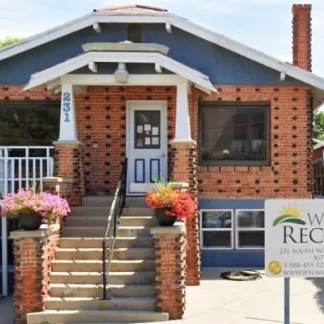Wyoming Behavioral Institute
Wyoming Behavioral Institute is a drug and alcohol rehab located in Casper, Wyom...
Wyoming Recovery in Casper, Wyoming stands as a reputable addiction treatment center for individuals and families. This facility provides comprehensive services, assisting individuals who struggle with substance use and co-occurring mental health disorders.
Wyoming Recovery’s Casper Campus, with its serene surroundings and evidence-based methodologies, offers an oasis of healing and transformation.
Offering a nurturing and structured environment, the residential treatment program at Wyoming Recovery provides an immersive therapeutic experience. Beyond traditional therapy, the Casper Campus integrates holistic therapeutic amenities. Whether it’s the dedicated art therapy room, spaces for meditation, or areas designated for physical activities, the facility emphasizes the importance of comprehensive well-being
For those who require a balance between treatment and daily life commitments, Wyoming Recovery offers a range of outpatient services. This flexibility ensures that individuals receive the support they need while also attending to personal, professional, or academic responsibilities.
Recognizing the critical initial phase of recovery, Wyoming Recovery provides medically supervised drug detox services. This essential service ensures that individuals can safely transition from substance dependence to managing withdrawal symptoms under the vigilant care of medical experts.
Contact us for more information: (307) 265-3791

Connect with Wyoming Recovery by calling their admissions team directly.
(307) 265-3791 Website Get DirectionsThe Joint Commission, formerly known as JCAHO, is a nonprofit organization that accredits rehab organizations and programs. Founded in 1951, the Joint Commision's mission is to improve the quality of patient care and demonstrating the quality of patient care.
Joint Commission Accreditation: Yes
Cognitive Behavioral Therapy (CBT) is a therapy modality that focuses on the relationship between one's thoughts, feelings, and behaviors. It is used to establish and allow for healthy responses to thoughts and feelings (instead of unhealthy responses, like using drugs or alcohol). CBT has been proven effective for recovering addicts of all kinds, and is used to strengthen a patient's own self-awareness and ability to self-regulate. CBT allows individuals to monitor their own emotional state, become more adept at communicating with others, and manage stress without needing to engage in substance abuse.
Research clearly demonstrates that recovery is far more successful and sustainable when loved ones like family members participate in rehab and substance abuse treatment. Genetic factors may be at play when it comes to drug and alcohol addiction, as well as mental health issues. Family dynamics often play a critical role in addiction triggers, and if properly educated, family members can be a strong source of support when it comes to rehabilitation Family sessions are an important part of Wyoming Recovery’s program. They feel that the family of the addict/alcoholic has been strongly affected by the illness, and as a part of their services, they provide family centered therapy.
Group therapy is any therapeutic work that happens in a group (not one-on-one). There are a number of different group therapy modalities, including support groups, experiential therapy, psycho-education, and more. Group therapy involves treatment as well as processing interaction between group members.
In individual therapy, a patient meets one-on-one with a trained psychologist or counselor. Therapy is a pivotal part of effective substance abuse treatment, as it often covers root causes of addiction, including challenges faced by the patient in their social, family, and work/school life.
Research clearly demonstrates that recovery is far more successful and sustainable when loved ones like family members participate in rehab and substance abuse treatment. Genetic factors may be at play when it comes to drug and alcohol addiction, as well as mental health issues. Family dynamics often play a critical role in addiction triggers, and if properly educated, family members can be a strong source of support when it comes to rehabilitation Family sessions are an important part of Wyoming Recovery’s program. They feel that the family of the addict/alcoholic has been strongly affected by the illness, and as a part of their services, they provide family centered therapy.
Group therapy is any therapeutic work that happens in a group (not one-on-one). There are a number of different group therapy modalities, including support groups, experiential therapy, psycho-education, and more. Group therapy involves treatment as well as processing interaction between group members.
In individual therapy, a patient meets one-on-one with a trained psychologist or counselor. Therapy is a pivotal part of effective substance abuse treatment, as it often covers root causes of addiction, including challenges faced by the patient in their social, family, and work/school life.
Group therapy is any therapeutic work that happens in a group (not one-on-one). There are a number of different group therapy modalities, including support groups, experiential therapy, psycho-education, and more. Group therapy involves treatment as well as processing interaction between group members.
In individual therapy, a patient meets one-on-one with a trained psychologist or counselor. Therapy is a pivotal part of effective substance abuse treatment, as it often covers root causes of addiction, including challenges faced by the patient in their social, family, and work/school life.
In individual therapy, a patient meets one-on-one with a trained psychologist or counselor. Therapy is a pivotal part of effective substance abuse treatment, as it often covers root causes of addiction, including challenges faced by the patient in their social, family, and work/school life.
Wyoming Behavioral Institute is a drug and alcohol rehab located in Casper, Wyom...
Central Wyoming Counseling (CWC) is a reputable dual-diagnosis substance abuse t...
Sunrise Resources Center is a private rehab located in Casper, Wyoming. Sunrise ...
Mercer Family Resource Center provides education, counseling, and prevention ser...